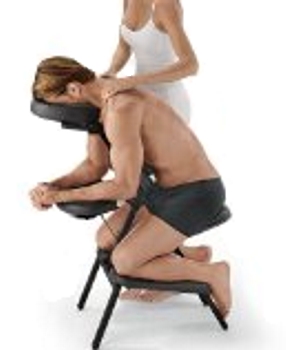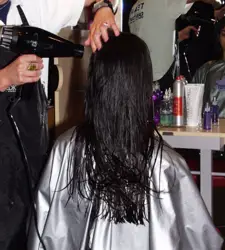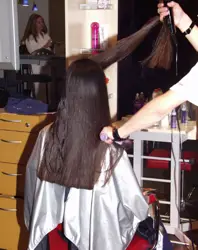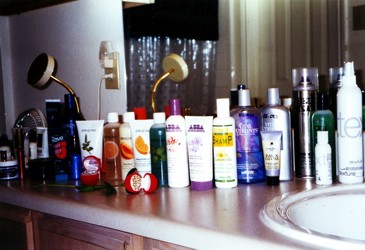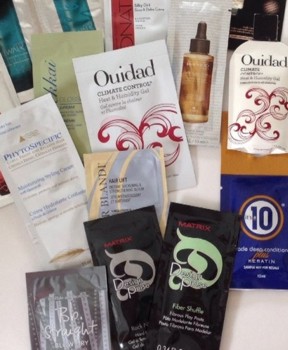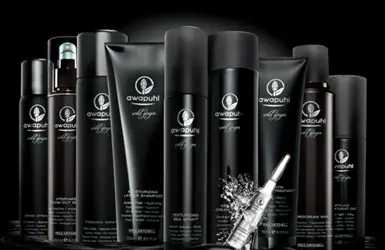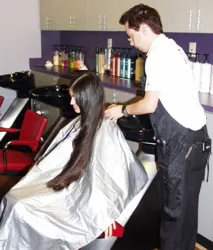
Dangers Of Hair Bartering
Dangers Of Hair BarteringIn my naive 20s with a newly minted massage license, I fell prey to bad bartering experiences while I was still living in St. Louis.
After being badly burned from bartering massages and eventually astrology or related readings (Feng Shui, handwriting analysis, numerology), I've refused to routinely barter for anything else.
It was very common in the cosmetology school I attended, and in the hair industry, to barter for services or products.
I was unwilling to participate, except during rare circumstances, or when I didn't stop and consider the dangers.
List Of Hair Bartering Dangers To Consider
Many new hairstylists, salon owners and even hair consumers are not aware of the dangers of hair bartering until they have suffered through a series of bad experiences.
Beware of some of the dangers of hair bartering listed below:1. Some people are more savvy at bartering than others.
Frequent barter providers often understand the first person to receive the barter service may be able to avoid returning the barter commitment to the person providing the initial service.
This was a common problem I experienced when doing massage bartering in St. Louis.
I learned quickly when I provided a one hour deep tissue massage to a barter partner before they had provided one to me, there was a high risk they may be too relaxed after I was finished, to return the service.
Or they might return the service, but not be able to provide an equivalent experience because of their physical state of relaxation. They might not provide an equivalent exchange.
If the therapist begged off from providing their barter service right after I provided mine, because they were too relaxed or just didn't feel like it, I learned quickly I had an uphill battle.
Since they had already received my service, they had little incentive to go out of their way to return the barter. It would fall on my shoulders to try and receive my barter time from them.
I had to chase more than one massage therapist to arrange for the barter service they owed me if they left before providing the services I was promised.
2. The barter partner might go out of business, leave the profession or not return phones calls and/or texts.
A lot of trust is required for bartering. If you don't know your barter partner, there is a much higher risk of them suddenly leaving town, changing their phone number or just avoiding you in order to skip out on their barter commitment.
I learned early on to only accept barter offers from massage therapists I had an ongoing relationship with, or completely trusted.
When a barter provider had no incentive to maintain a relationship with me, they also had no reason to make an effort to deliver on their barter promise.
If they got busy with other clients, their lives or just really didn't care to honor their commitment, they might never deliver on their barter promise.
3. Barter only with those who have skilled services you desire.
During my time in braiding school, I was initially approached to barter for braiding services. Since the braiding took place on school property, I figured I would be able to receive my service after I provided the initial braiding.
Although I did happily receive the braiding on my hair I had bartered for, the skill set of the person I bartered with was very limited.
While he successfully wore the bartered braids I created for him for many weeks, my braids started to unravel after just one day. Although he tried to fix them for me, he was never able to do so.
Unfortunately I had not really considered the skill set of the person I bartered with before I agreed to the exchange.
I was a new student at the school and had not had time to really evaluate the expertise of the other students.
When agreeing to any type of barter service exchange, always evaluate the skill set you will be providing and weigh it with the expertise of the person you will be bartering with.
4. Make sure you have an equal exchange of products.
When HairBoutique.com was first founded in the mid-1990s, we launched the HairTalk™ forum. At the time, visitors requested a barter area on the forum where they could trade for used hair and beauty products.
Although we considered the option very carefully, there were a wide range of legal and tax issues which convinced us the risks outweighed the advantages.
Over the years many of the hair and beauty related websites have offered bartering areas which both good and bad results.
When it comes to bartering for used hair products, it's ultimately up to the individual parties to beware during the trading transactions.
It's always important to only trade for any products - hair, beauty or otherwise - you really want and need.
5. Be very clear about the bartering expectations.
If you are a talented hair professional or a hair consumer with special skills, people will seek you out for your expertise or products.
Always be clear in any bartering situation about the rules of the barter. Make sure you either have something in writing or you are very clear about what you will receive in exchange for what you provide.
Make sure a time limit is established for the bartering.
6. Bartering can happen in an unexpected way
For many years I visited a spa where I received facials. My long time technician accidentally discovered my expertise with astrology after reading one of my blogs.
Shortly after she discovered my expertise, she started to spend my time on her table pumping me for free information about her chart and her boyfriend. She asked endless questions.
Although I politely expressed my unwillingness to pay her for facials while providing her with astrological readings, she ignored my requests to stop.
She also didn't offer any type of barter for asking for my knowledge.
Not one to complain unnecessarily, I just quietly discontinued my patronage of her services and the spa.
Unfortunately hairstylists, doctors, attorneys and many other professionals sometimes suffer from similar free advice bartering/no bartering experiences.
Usually the best way to handle this situation when it occurs is offer to set up a paid consultation. If the other person ignores your suggestion, walk away.
7. Bartering comes with limited recourse.
If you barter for hair products and/or services and have a bad experience, you have limited recourse to settle any problems.
Since bartering may or may not be considered an informal arrangement, you may not be able to report bartering ripoffs to any organizations such as The Better Business Bureau or government agencies.
Many informally organized bartering clubs or online forums offer a way to report ripoffs. You can also write Yelp or similar reviews detailing your experiences.
Remember to be very accurate about your personal experience when reporting a bartering ripoff to avoid any defamation of character legal issues.
Summary - Dangers Of Hair Bartering
If someone really values you and the hair services or products you provide, they will be more than happy to initially offer to pay for them.
When for some reason they are unable to pay and they really want your hair services or products, they will be willing to propose a very fair barter.
If a proposed barter is something you really want to experience, make sure you have considered all the potential dangers of bartering.
There are always exceptions to every situation and life experience. Be sure to always do your homework and go into any situation with your eyes open.
Dedication: This blog is dedicated to Anni and our talks about the pros and cons of bartering for services.Social Media Network Information
Please follow us on Twitter at: https://Twitter.com/HairBoutique. I look forward to meeting new people from all walks of Twitter and learning from their Tweets.






